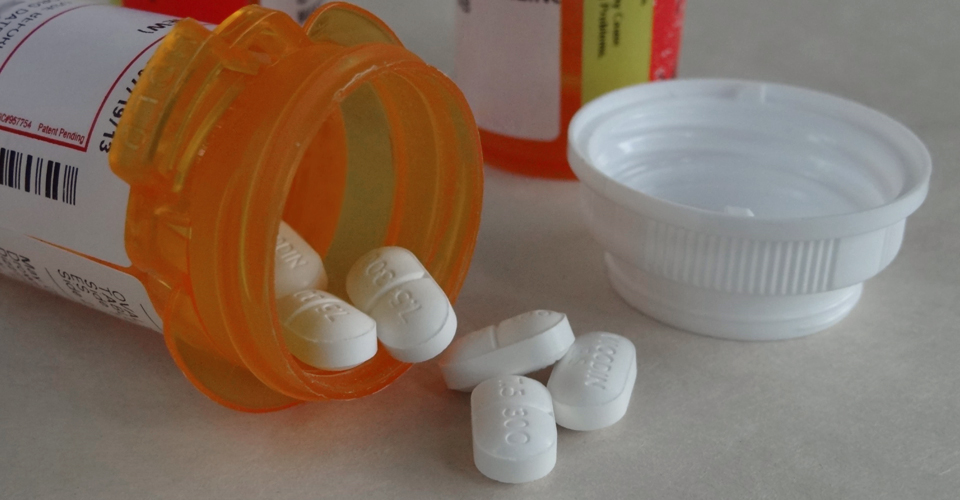This article is the sixth in a series about the epidemic of opioid addiction and how NEOMED is training future physicians and pharmacists to help.
Taylor Baith, a Master of Public Health (MPH) student and future College of Medicine student at NEOMED, has seen firsthand how opioids can be overprescribed, contributing to the national epidemic of addiction.
Just a few weeks ago, a friend of hers was injured playing flag football. “After sitting for hours in the ER, he left with a flimsy splint and a large prescription in tow. I was shocked to discover that the physicians had written him a prescription for 30 pain killers; all I could think was that a small finger injury was opening the door to a serious addiction problem,’’ says Baith.
“I voiced my concerns telling him that he would be fine without the prescription and that they had given him way too many pills.’’
Nearly six out of ten U.S. adults who used opioids had or expected to have leftover medication, said an article in JAMA Internal Medicine. And here’s a troubling statistic: “Nearly 68 percent of those who used prescription pain relievers non-medically in 2012-2013 got them from friends or relatives,’’ according to the 2013 Substance Abuse and Mental Health Services Administration (SAMHSA) National Survey on Drug Use and Health.
With all that in mind, consumers need a safe way to dispose of excess opioids, so that no one uses them improperly or pollutes the ground water by flushing them down the toilet or putting loose pills in the garbage. But how?
In Northeast Ohio, the County of Summit Alcohol, Drug Addiction and Mental Health (ADM) Services Board has begun testing a solution: a drug deactivation pouch called Deterra. The user opens the pouch, places the unwanted pills inside and deactivates them by adding tap water to the chemicals contained inside. The closed pouch can then be thrown away with other household garbage.
Summit County recently received a supply of 40,000 Deterra pouches from Mallinckrodt Pharmaceuticals, a distributor that is making them available at no cost as a way to combat misuse and abuse. Physicians may request bags from the company, and anyone can obtain them from the pharmacies at local Acme grocery stores.
Putting Medicine at the Service of Public Health
As an independent study project with Amy Lee, M.D. (’88), M.P.H., M.B.A., at NEOMED, Taylor Baith learned about Deterra from working with the ADM Board’s Summit County Opiate Task Force this fall. By attending ADM meetings, she is learning what programs are needed by a county that is among the nation’s hardest hit by the opioid epidemic.
Baith was attracted to the academic discipline of public health because of how it teaches a person to look at the bigger picture. “If one patient comes in with a problem and you treat them and send them on their way, you might not realize that there are others like them who have untreated problems--especially mental health problems. I’m very interested in public health, especially mental health, because you think about how to treat an entire population,’’ she says.
So, after completing the B.S./M.D. program at Youngstown State University, Baith decided to take a year off to do a MPH program (compressing the usual two-year program into one year plus a summer) before beginning her first year as a College of Medicine student at NEOMED in Fall 2017.
As part of her independent study with Dr. Lee, Baith is evaluating the efficacy of the Deterrra pouch, which is in the early stages of use in a limited number of communities around the nation.
“Our goal in Summit County is to determine what kind of impact these pouches could have on addiction prevention. With the rising numbers of opiate-related deaths, it is now clear that new methods are the only hope in stopping this epidemic,’’ says Baith. ‘’With so many treatment options already being available to addicts, the ADM Board determined that the best line of defense was to focus on preventing the start of new addictions,’’ she adds.
By evaluating the program as her capstone project for the MPH degree, Baith hope to pinpoint any aspects of the disposal that need to be fixed or tweaked to make the new technology the most successful. When one customer asked for multiple pouches to dispose of many pills, she was told ‘’one to a customer,’’ which unintentionally created a barrier.
Baith hopes that the feedback she provides will help to guide the Deterra program toward success over the next few years.
